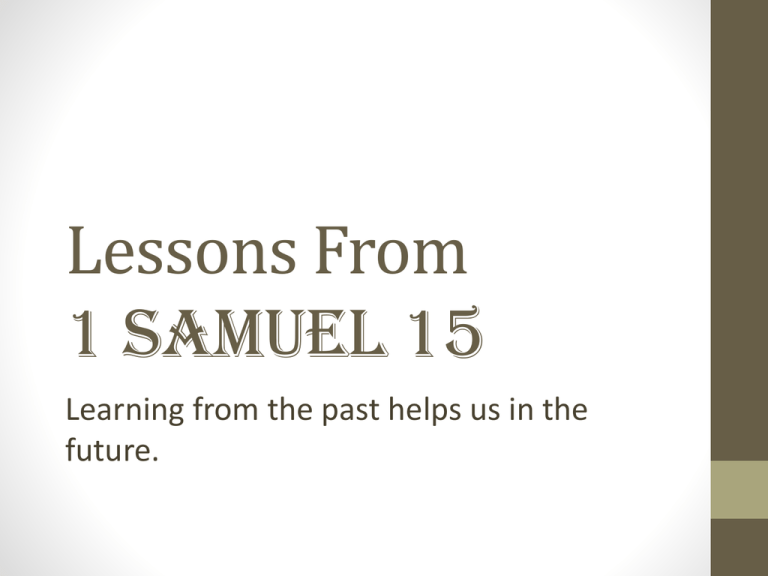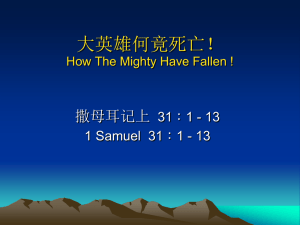Lessons From 1 Samuel 15
advertisement

Lessons From 1 Samuel 15 Learning from the past helps us in the future. Romans 15:4 • “For whatever was written in earlier times was written for our instruction, that through perseverance and the encouragement of the scriptures we might have hope”. • Since all scripture was written in earlier times, it was all written for our instruction. • 2 Timothy 3:16 tells us that the scripture inspired of God is profitable for instruction in righteousness. Verse 1 • “Then Samuel said to Saul, “the LORD sent me to anoint you as king over His people, over Israel; now therefore, listen to the words of the LORD.” • Saul was made king over GOD’S people, not his. • Saul is the Lord’s servant, not the other way around as so many try to make God a servant today. Verse 1 • The message from God is important. • No matter who brings the message. • The words of the LORD are authoritative. • As we will see the words of the LORD will not be misunderstood by Saul, and… • We should not misunderstand the words of the LORD. • The message was clear. Verse 2 • “Thus says the LORD of hosts, ‘I will punish Amalek for what he did to Israel, how he set himself against him on the way while he was coming up from Egypt’.” • God says there is a reason for the instruction to Saul. • We may not always understand why God had people killed, but in this case, we know why. Verse 3 • “Now go and strike Amalek and utterly destroy all that he has, and do not spare him; but put to death both man and woman, child and infant, ox and sheep, camel and donkey.’” • Sounds pretty clear to me. • You might wonder how anyone could misunderstand this message. Verse 7 • “So Saul defeated the Amalekites, from Havilah as you go to Shur, which is east of Egypt. • Saul had set up an ambush with 210,000 men. • He spared the Kenites. • But that is not all that he spared. Verse 8 • “And he captured Agag the king of the Amalekites alive, and utterly destroyed all the people with the edge of the sword.” • The keyword here is “alive” • Right away, we see Saul failing to keep the clear instruction of the Lord. • But Saul did keep “most” of the commandment of the LORD. • Is that good enough to please God? Verse 9 • “But Saul and the people spared Agag and the best of the sheep, the oxen, the fatlings, the lambs, and all that was good, and were not willing to destroy them utterly; but everything despised and worthless, that they utterly destroyed.” • Greed was at work here, and greed is evil. • They were not willing to follow God’s command. Verse 12 • ”And Samuel rose early in the morning to meet Saul; and it was told Samuel, saying, “Saul came to Carmel, and behold, he set up a monument for himself, then turned and proceeded on down to Gilgal”.” • A little bit of pride on the part of Saul. • Taking credit for the victory that belonged to God. Verse 13 • “And Samuel came to Saul, and Saul said to him, “blessed are you of the LORD! I have carried out the command of the LORD”.” • Really? • Compare verse 2 with verse 9 Verse 14 • “But Samuel said, “what then is this bleating of the sheep in my ears, and the lowing of the oxen which I hear?” • Samuel already knew how Saul had disobeyed the voice of the LORD. • Samuel is making a point to Saul, that he knows differently from what Saul told him. • Just imagine Saul saying “uh oh”. Verse 15 • “And Saul said, “they have brought them from the Amalekites, for the people spared the best of the sheep and oxen, to sacrifice to the LORD your God; but the rest we have utterly destroyed”. • Shifting blame, but who was in charge? • Maybe if we say there were good intentions, everything will be alright. Verse 15 • Sacrifices were supposed to come from your own flock, not someone else. • These people showed a total disregard for God in this. • People today show the same disregard when they ignore God’s instructions to do what they want to do. • They think everything alright if we do it for God. Verse 19 • “Why then did you not obey the voice of the LORD, but rushed upon the spoil and did what was evil in the sight of the LORD?” • Anything not in compliance with God’s instructions is considered “evil” by God. • Not obeying is “evil” of itself. Verse 20-21 • “ Then Saul said to Samuel, “I did obey the voice of the LORD, and went on the mission on which the LORD sent me, and have brought back Agag the king of Amalek, and have utterly destroyed the Amalekites, (21) But the people took some of the spoil, sheep and oxen, the choicest of the things devoted to destruction, to sacrifice to the LORD your God at Gilgal.” Verse 20-21 • Saul argues that he did what he was commanded, but…. • Even in his explanation he admits not doing what God commanded, by sparing the king of Amalek. • Back then, capturing a king was a trophy to be paraded around, and glory cast upon the conquering king. Verse 20-21 • Once again Saul blames the people for sparing some things, but they had a noble purpose for doing so. • So that was supposed to make everything alright? • A lot of people do things differently from what God commands with a noble purpose. • They are still wrong to do so. Verse 22 • “And Samuel said, “Has the LORD as much delight in burnt offerings and sacrifices as in obeying the voice of the LORD? Behold to obey is better than sacrifice, and to heed than the fat of rams.” • Many people make a pretense to worship God, and think they are okay with Him. • Truth is that obedience is more important than all emotions and think-so’s of mankind. Conclusion • God’s commands are clear and understandable. • Any reasoning around not doing those commands are useless. • We will be rejected by God if we fail to heed His commands. • Obedience is essential for salvation.







